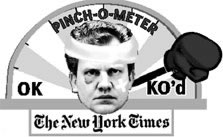Wednesday, May 20, 2009
Will the NY Times' disdain of the tax deduction for charitable contributions be changed by its need for charity?
President Obama, as a first step in his plan to increase taxes on "the rich", is trying to cut the top rate at which charitable contributions can be deducted from 35% to 28% -- but has received precious little cooperation from his Democratic Congress on this so far.
The New York Times in a remarkable editorial (that really shows how the Times' brain trust views the world) not only expresses frustration on Obama's behalf, but goes on to suggest that since the deduction reduces the amount of tax money the government gets to spend, maybe the government should direct how private charitable donations are spent ... or better yet, hey, let's kill the deduction entirely!
Philanthropic contributions are usually tax-free. They directly reduce the government’s ability to engage in public spending. Perhaps the government should demand a role in charities’ allocation of resources in exchange for the tax deduction. Or maybe the deduction should go altogether.Ah, but before staking out that position, perhaps the Times' editors should consider how their employer itself may be moving on from being a figurative charity chase to a literal one.
Figurative, as the Times' stock price over the last five years is down 85% (chart) ... while its first-quarter free cash was down to $34 million ... after a loss for the quarter of $74.5 million ... and against debt of $1.3 billion ... of which $1.1 billion was spent by Times CEO "Pinch" Sulzberger in 1993 to buy the Boston Globe, which is projected to lose $85 million this year.
But most ominously for the Times as we know it, it is a family-controlled business and its payout to the Sulzberger family has dropped 99%, from as much as $425 million per year to $4.5 million. When that happens to a family business, all the cousins who are unaccustomed to such poverty tend to want to get their money in other ways, such as through a sale. See: Wall Street Journal and Rupert Murdoch.
You'll note that many of the links above go to Murdoch's tabloid New York Post, which has been detailing the fall of the Times gleefully...
Desperate to cover $3.1 billion in liabilities and plunging income, The New York Times might use a bailout trick that's worked wonders for other worthy causes -- pledge cash and get a tote bag.Yes, "Times Select", the paper's past attempt to charge for viewing its editorial page and other valuable content, was a dismal failure -- but maybe people will volunteer payment for content if they get a baseball cap or tote bag!
Or a ball cap, T-shirt or even an exclusive sit-down at one of the paper's hallowed Page One editorial meetings where history is made.
Executives at the company have been outlining the pledge strategy to employees as part of their latest rescue effort. It involves leveraging the Times' online content, currently free to all, through various payment schemes. The pledge plan would use a "membership" system ...
It's no secret that Murdoch would love to compete the Times into the ground, buy it out of bankruptcy, and (absent hanging a Sulzberger head over his mantle) fold it into the Post as a supplement. And, with the Journal working the high end and the Post the low end, he's off to a not bad start. If the Times continues its present course, will there be any way for it to avoid such a fate?
Perhaps by becoming a charity case literally...
why is David Geffen ... now reportedly eyeing The New York Times, so keen on stuffing his portfolio with an investment that seems dead on arrival...?Such a deal would be structured by setting up a tax-exempt charitable trust to purchase the Times, contributions to which would be tax deductible (as with Poynter). The trust would be funded with contributions from David Geffen and his like-minded friends, whom one can safely guess are in the top, 35% tax bracket.
Geffen declined to publicly comment ... But two people familiar with Geffen's thinking say the answer is simple: an acquisition of the Times wouldn't be a financial investment. If Geffen were successful in landing The New York Times, said one of the confidantes, he'd convert it into a nonprofit institution.
He would regard the newspaper, perhaps the world's most influential journalistic enterprise, as a national treasure meriting preservation into perpetuity. His model would be the ownership structure of Florida's St. Petersburg Times, which is controlled by a nonprofit educational institution, the Poynter Institute for Media Studies ... [Newsweek]
Now, Geffen & Co. have a maximum amount they are willing to pay out-of-pocket to purchase the New York Times. For every $100 they are willing to pay out-of-pocket, with the full charity deduction they'll be willing to contribute $154 to the trust, to pay Pinch and family -- and they'll have a big tax advantage in out-bidding Murdoch (or whomever) who would have to make a competing purchase offer using taxable funds. But without the deduction, they will contribute only $100 per every $100 they are willing to pay.
So with the deduction Pinch & family can receive up to 54% more for their stock in the Times than without.
Should such a deal ever be put on the table, what do you suppose the Sulzberger cousins will all be telling Pinch the Times' editorial position on the charitable contribution deduction should be?
And what will the Times' editors and writers attitude towards the deduction be -- as they consider the alternatives of keeping their current jobs or becoming unemployed and trying to beg a new at one of the local tabloids?
A little bit more respectful, I suspect!

Pinch-o-Meter courtesy of the NY Post.
